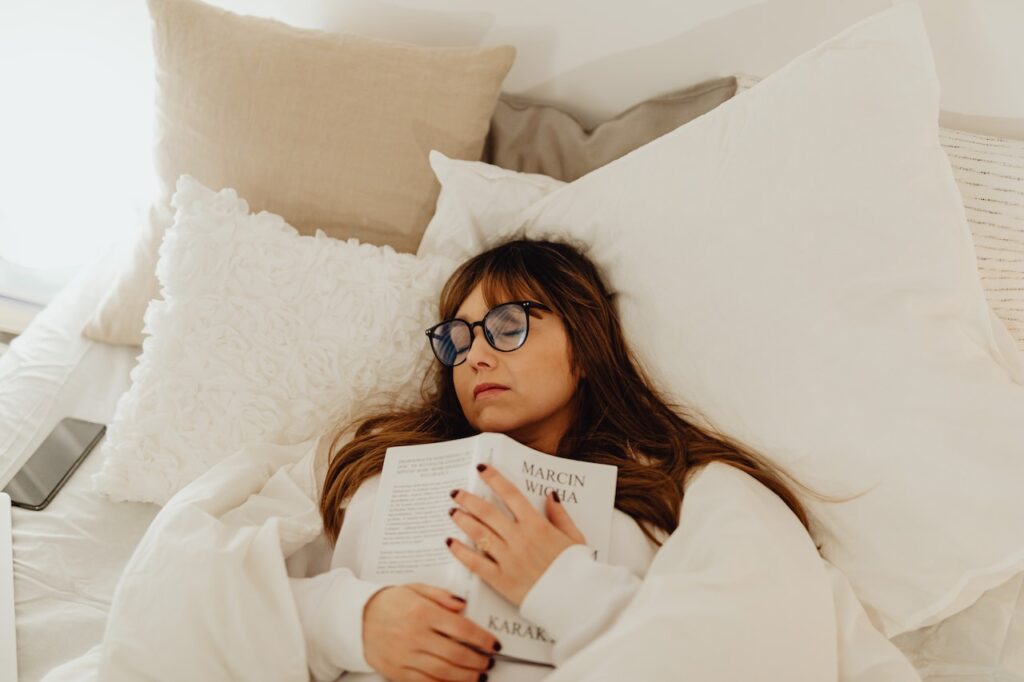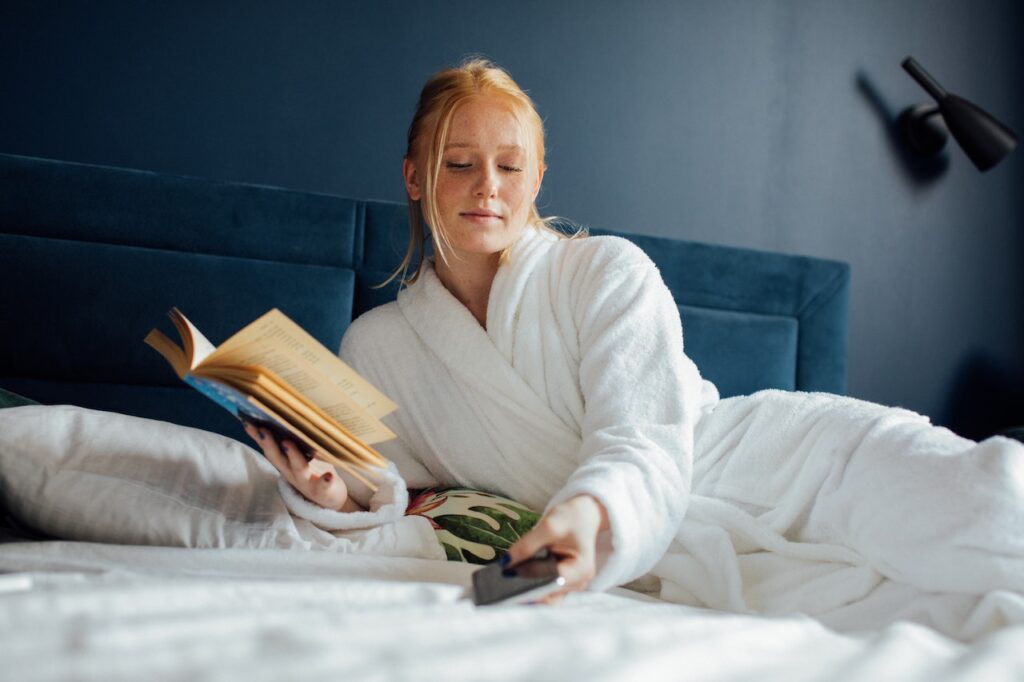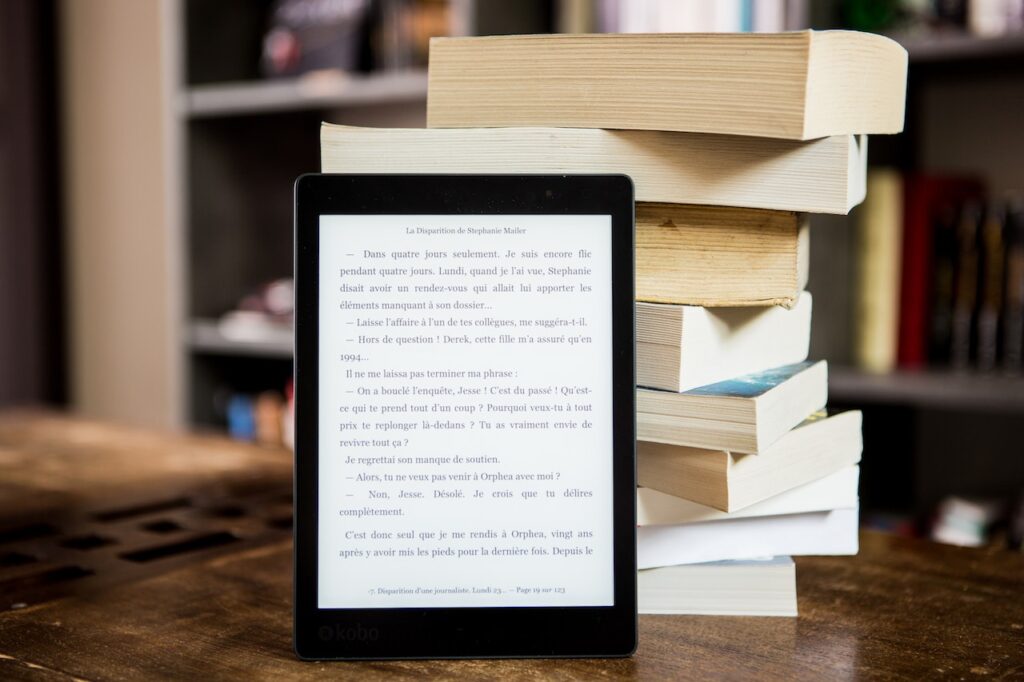Can reading a book help you sleep? This seemingly simple question opens the door to a world of tranquility, inviting us to explore the profound connection between literature and the art of restful slumber.
Can reading a book help you sleep? Explore the soothing power of stories, sleep-friendly genres, and relaxing habits.
In this article:
- Can reading a book help you sleep? Exploring the connection
- Reading vs. screen time: Which impacts sleep more?
- Can audiobooks and E-books help you sleep?
- Can reading a book help you sleep? Choosing sleep-friendly genres
- Can reading a book help you sleep? Building relaxing habits
CAN READING A BOOK HELP YOU SLEEP? EXPLORING THE CONNECTION
One of the critical reasons reading aids sleep is its ability to act as a natural stress reliever. In our fast-paced world, going to bed with a mind buzzing with thoughts, worries, and anxieties is common. When you engage with a compelling story or immerse yourself in an exciting topic, your mind gradually unwinds. Reading serves as a mental escape, allowing you to leave behind the day’s stresses and enter a different, more peaceful world.
Moreover, reading, particularly from a printed book, is gentler on your eyes than the screens’ harsh glow. The absence of blue light, known for disrupting sleep patterns, ensures your body’s natural sleep-wake cycle isn’t disturbed. This gentle transition from the stimulating activities of the day to the calmness of reading signals your brain that it’s time to wind down, making it easier to fall asleep when you finally decide to put the book down.
Furthermore, the very ritual of reading before sleep establishes a comforting routine. Like babies associate a bedtime story with sleep, our brains learn to recognize reading as a prelude to rest. Over time, this conditioning helps you relax and prepare for sleep as soon as you pick up a book.
In essence, reading is not just a delightful pastime; it’s a powerful tool that helps quiet the mind, soothe the senses, and pave the way for a tranquil night’s sleep. So, the next time you tossing and turning, consider reaching for a good book. You might find the remedy for your sleepless nights within the pages of a story.
READING VS. SCREEN TIME: WHICH IMPACTS SLEEP MORE?
In the digital age, the battle between books and screens has become a defining aspect of modern leisure. There are often questions such as: Is it bad to sleep with the TV on? or Can reading a book help you fall asleep?
Screens, be they smartphones, tablets, or computers, emit a blue light that disrupts melatonin production, the hormone responsible for regulating sleep. Prolonged exposure to this artificial light in the evening confuses our circadian rhythm, signaling to our brain that it’s daytime even when it’s not. That can lead to difficulty falling asleep.
On the contrary, reading a physical book doesn’t involve exposure to disruptive blue light. Instead, a reading lamp’s soft, warm glow provides a calming ambiance. Moreover, the tactile sensation of turning pages and the comforting smell of paper create a relaxing sensory experience. This multisensory engagement with a book creates a conducive environment for winding down, making it easier to transition from the busyness of the day to a state of relaxation conducive to sleep.
When we delve into a thrilling novel or an intellectually stimulating piece of literature, our minds are actively engaged. The intricate plot twists, character developments, and imaginative landscapes demand our attention and mental involvement. While these gripping narratives might keep us turning pages late into the night, they do so by fueling our curiosity and triggering our intellect.
In stark contrast, the passive consumption often associated with screen time can harm our sleep. Scrolling through social media feeds or binge-watching TV shows might seem relaxing. Still, it primarily stimulates our brains superficially and fleetingly. While this might momentarily provide a sense of satisfaction, it needs more depth of engagement from immersing ourselves in a well-written book.
CAN AUDIOBOOKS AND E-BOOKS HELP YOU SLEEP?
Audiobooks and e-books have transformed how we consume literature in the digital landscape. But beyond their convenience, can they serve as tools to help us achieve better sleep?
Audiobooks, with their immersive narrations and carefully crafted audio elements, present a unique auditory experience. When a well-narrated story captures our attention, it transports our minds to different worlds, much like oral traditions and bedtime stories have captivated listeners for centuries. The gentle cadence of a narrator’s voice can create a calming effect, making audiobooks an excellent choice for those seeking relaxation before sleep.
On the other hand, e-books offer a visual experience similar to traditional reading, albeit on a digital screen. However, the key lies in the customization options they provide. Many e-readers allow users to adjust screen brightness, font size, and background color. By dimming the screen and opting for warm, sepia-toned backgrounds, readers can mitigate the impact of blue light, making e-books more eye-friendly.
By leveraging these technologies mindfully, you can enjoy literature while ensuring a peaceful night’s sleep.
CAN READING A BOOK HELP YOU SLEEP? CHOOSING SLEEP-FRIENDLY GENRES
When it comes to finding the right book to help you unwind and ease into a peaceful slumber, the choice of genre plays a pivotal role. Specific literary genres possess qualities conducive to relaxation and sleep. Here’s a guide to choosing sleep-friendly genres that can transform your bedtime reading into a tranquil ritual.
- Escapist Fiction: Engaging in escapist fiction, such as fantasy or science fiction, allows your mind to wander into imaginative worlds far removed from everyday stressors. These genres often involve intricate world-building and compelling narratives that capture your attention while providing a mental escape.
- Romance Novels: Romance novels, focusing on relationships and emotional journeys, evoke warmth and contentment. The emotional engagement with characters’ lives can create a sense of empathy and connection, fostering a relaxed state of mind ideal for sleep.
- Cozy Mysteries: Mysteries, especially cozy mysteries, offer intriguing plotlines without excessive violence or intense suspense. They challenge your intellect without overstimulating, making them perfect for winding down before sleep.
- Historical Fiction: Historical fiction novels set in a different era often have a slower pace, allowing readers to immerse themselves in a richly detailed world. Careful attention to historical context and character development can create a soothing reading experience.
- Self-Help and Inspirational Literature: Positive and motivational books, whether focused on personal growth, mindfulness, or inspirational stories, can instill a sense of calm and optimism. Reading about overcoming challenges or finding inner peace can be empowering, promoting a relaxed state conducive to sleep.
Experiment with different genres to discover what resonates best with your senses and emotions.
CAN READING A BOOK HELP YOU SLEEP? BUILDING RELAXING HABITS
Creating a calming pre-sleep routine is essential for a restful night’s sleep, and incorporating reading into your bedtime ritual can be a powerful way to unwind and prepare your mind for slumber. Building relaxing habits around your reading experience can further enhance its effectiveness in promoting better sleep.
- Establish a consistent reading time: Set aside a specific time each night dedicated to reading. Consistency signals your body that it’s time to wind down, helping establish a sleep-inducing routine.
- Create a serene reading environment: Designate a quiet, comfortable space for your reading. Dim the lights, use soft lighting, and eliminate distractions. A cozy blanket or a pile of soft pillows can add to the soothing ambiance.
- Practice mindful reading: Engage in mindful reading by focusing on the book’s words, textures, and smells. Allow your mind to immerse itself in the story entirely. Mindfulness promotes relaxation, reducing racing thoughts and stress.
- Set a reading limit: While reading is relaxing, it’s crucial not to overindulge and disrupt your sleep schedule. Set a reading limit to ensure ample time for a night’s rest.
Incorporating these habits transforms your reading session into a calming bedtime ritual. Over time, your mind will associate reading with relaxation, paving the way for a tranquil and restful night’s sleep.
_____
Can reading a book help you sleep? The answer is a resounding yes. So, as you curl up with a story tonight, remember that the world of literature enriches your mind and gently guides you into the peaceful realm of dreams. Happy reading, and sweet dreams!
This post may contain affiliate links. You can read the affiliate disclosure here.










